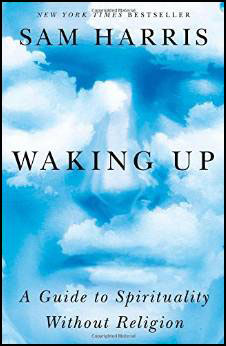411 Spirituality, the Sam Harris way
I have just finished reading Waking Up by Sam Harris. I read the book in two sessions, for six hours right after I bought it on Saturday, and another six hours on Sunday … I only just could put it down for meals and toilet-breaks.
Sam Harris extols spirituality without religion, which is very much the subject of my book en.light.en.ment … a notion I had been familiar with since The Book of Atheist Spirituality by André Comte-Sponville. As I read Waking Up I had ever so many ‘aha’ moments, where I found myself in agreement with Harris’ ideas.

However, Sam Harris is a neuroscientist and his chapter on consciousness
was hard work for me; furthermore, he has studied Eastern philosophies and religions deeply and adapted the Buddhist tenet that the self is an
illusion, belief in its existence (or indeed a soul) is unwarranted and
attachment to the self can be overcome in meditation.
The Eastern concept of
spirituality is that all is one and no duality exists … as opposed to our
belief in a soul and/or self (which I extend to the belief in a universal
consciousness). So that is the point where Harris’ and my paths diverge. I
believe in an inner life, centred around my soul; though - somewhat
paradoxically, perhaps - I do take on board that the notion of soul is a
mind-construct (as is that of the existence of God, since there’s no scientific
proof they exist).
But this is the thing: I find the esoteric doctrine of the
oneness of all mighty unhelpful, since I experience duality daily on a
practical level, because on the one hand I can pinch myself and know of the
reality of flesh and the material, and on the other hand I think, meditate and
feel compassion … which I consider to be non-material activities (I know,
according to the doctrine of the oneness of all things, those activities are
seen as on par with what I deem material, because they are merely electronic
impulses whooshing around the brain between neurons … to boot, the theoretical
physicist Stephen Hawking says, on a quantum level everything is energy anyway;
how remarkable that apparently Buddhists have had this insight for some two
thousand five hundred years).
So, I must concede I have not evolved to the
enlightened state of oneness with the all; but the point is, I see
enlightenment in a different light altogether, where it is neither a religious
nor an esoteric process. One may ask now: Who is right? Myself with my duality,
or Sam Harris and the Buddhist teaching of all is one (which - after all - is
supported by science)? I said before the concept of God is a mind-construct;
this means all religions (and necessarily all philosophies) are created in the
mind. Does that include Buddhism?
Now, if one meditates for eighteen hours a
day, does the time ever come when one realizes the insignificance of whether
duality or oneness of the all are the correct (or more desirable) doctrine? Are
the two exclusive of one another? If the oneness of all is a dogma one can’t
relinquish ... could one accept that duality may exist as some sort of a sub-doctrine?
Are you with me, or have I lost you? Discuss. Anyway, I found much good stuff in
Waking Up (does the title refers to the definition of Buddha as ‘the
awakened one’?) … above all the concept that living in the moment has the
potential to put our mind at peace, and meditation is the process best suited
to achieve just that.
I have essays on BUDDHISM, DUALITY, six on GOD, one I call KNOW YOUR SELF and three on MEDITATION
.